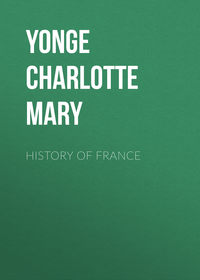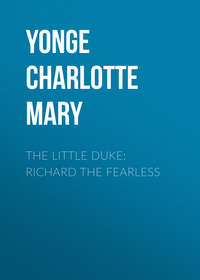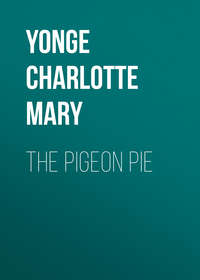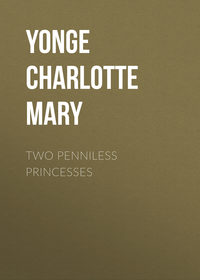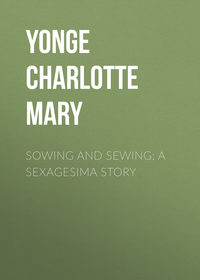
The Heir of Redclyffe
One of the first drives that Charles and Philip took, after the latter was equal to any exertion, was to Thorndale. There Charles was much amused by the manner in which Philip was received, and he himself, for his sake; and as he said to Amabel on his return, there was no question now, that the blame of spoiling Philip did not solely rest at Hollywell.
Finding only Lady Thorndale at home, and hearing that Lord Thorndale was in the grounds, Philip went out to look for him, leaving Charles on the sofa, under her ladyship’s care. Charles, with a little exaggeration, professed that he had never been so flattered in his whole life, as he was by the compliments that reflected on him as the future brother-in-law of Philip; and that he had really begun to think even Laura not half sensible enough of her own happiness. Lady Thorndale afterwards proceeded to inquiries about the De Courcy family, especially Lady Eveleen; and Charles, enlightened by Charlotte, took delight in giving a brilliant description of his cousin’s charms, for which he was rewarded by very plain intimations of the purpose for which her son James was gone to Kilcoran.
On talking the visit over, as they drove home, Charles asked Philip if he had guessed at his friend’s intentions. ‘Yes,’ he answered.
‘Then you never took the credit of it. Why did you not tell us?’
‘I knew it from himself, in confidence.’
‘Oh!’ said Charles, amusing himself with the notion of the young man’s dutifully asking the permission of his companion, unshaken in allegiance though the staff might be broken, and the book drowned deeper than did ever plummet sound. Philip spoke no more, and Charles would ask no more, for Philip’s own affairs of the kind were not such as to encourage talking of other people’s. No explanation was needed why he should now promote an attachment which he had strongly disapproved while James Thorndale was still in the army.
A day or two after, however, came a letter from Charlotte, bringing further news, at which Charles was so amazed, that he could not help communicating it at once to his companions.
‘So! Eveleen won’t have him!’
‘What?’ exclaimed both.
‘You don’t mean that she has refused Thorndale?’ said Philip.
‘Even so!’ said Charles. ‘Charlotte says he is gone. “Poor Mr. Thorndale left us this morning, after a day of private conferences, in which he seems to have had no satisfaction, for his resolute dignity and determination to be agreeable all the evening were”—ahem—“were great. Mabel cannot get at any of the real reasons from Eveleen, though I think I could help her, but I can’t tell you.”’
‘Charlotte means mischief.’ said Charles, as he concluded.
‘I am very sorry!’ said Philip. ‘I did think Lady Eveleen would have been able to estimate Thorndale. It will be a great disappointment—the inclination has been of long standing. Poor Thorndale!’
‘It would have been a very good thing for Eva,’ said Amabel. ‘Mr. Thorndale is such a sensible man.’
‘And I thought his steady sense just what was wanting to bring out all her good qualities that are running to waste in that irregular home,’ said Philip. ‘What can have possessed her?’
‘Ay! something must have possessed her,’ said Charles. ‘Eva was always ready to be fallen in love with on the shortest notice, and if there was not something prior in her imagination, Thorndale would not have had much difficulty. By the bye, depend upon it, ‘tis the tutor.’
Philip looked a little startled, but instantly reassuring himself, said,—
‘George Fielder! Impossible! You have never seen him!’
‘Ah! don’t you remember her description!’ said Amy, in a low voice, rather sadly.
The very reason, Amy,’ said Charles; ‘it showed that he had attracted her fancy.’
Philip smiled a little incredulously.
‘Ay!’ said Charles, ‘you may smile, but you handsome men can little appreciate the attractiveness of an interesting ugliness. It is the way to be looked at in the end. Mark my words, it is the tutor.’
‘I hope not!’ said Philip, as if shaken in his confidence. ‘Any way it is a bad affair. I am very much concerned for Thorndale.’
So sincerely concerned, that his head began to ache in the midst of some writing. He was obliged to leave it to Charles to finish, and go out to walk with Amy.
Amabel came in before him, and began to talk to Charles about his great vexation at his friend’s disappointment.
‘I am almost sorry you threw out that hint about Mr. Fielder,’ said she. ‘Don’t you remember how he was recommended?’
‘Ah! I had forgotten it was Philip’s doing; a bit of his spirit of opposition,’ said Charles. ‘Were not the boys to have gone to Coombe Prior?’
‘Yes’ said Amabel, ‘that is the thing that seems to have made him so unhappy about it. I am sure I hope it is not true,’ she added, considering, ‘for, Charlie, you must know that Guy had an impression against him.’
‘Had he?’ said Charles, anxiously.
‘It was only an impression, nothing he could accuse him of, or mention to Lord Kilcoran. He would have told no one but me, but he had seen something of him at Oxford, and thought him full of conversation, very clever, only not the sort of talk he liked.’ ‘I don’t like that. Charlotte concurs in testifying to his agreeableness; and in the dearth of intellect, I should not wonder at Eva’s taking up with him. He would be a straw to the drowning. It looks dangerous.’
They were very anxious for further intelligence, but received none, except that Philip had a letter from his friend, on which his only comment was a deep sigh, and ‘Poor Thorndale! She little knows what she has thrown away!’ Letters from Kilcoran became rare; Laura scarcely wrote at all to Philip, and though Mrs. Edmonstone wrote as usual, she did not notice the subject; while Charlotte’s gravity and constraint, when she did achieve a letter to Charles, were in such contrast to her usual free and would-be satirical style, that such eyes as her brother’s could hardly fail to see that something was on her mind.
So it went on week after week, Charles and Amabel wondering when they should ever have any notice to go home, and what their family could be doing in Ireland. October had given place to November, and more than a week of November had passed, and here they still were, without anything like real tidings.
At last came a letter from Mrs. Edmonstone, which Amabel could not read without one little cry of surprise and dismay, and then had some difficulty in announcing its contents to Philip.
‘Kilcoran, Nov. 8th.‘My Dearest Amy,—You will be extremely surprised at what I have to tell you, and no less grieved. It has been a most unpleasant, disgraceful business from beginning to end, and the only comfort in it to us is the great discretion and firmness that Charlotte has shown. I had better, however, begin at the beginning, and tell you the history as far as I understand it myself. You know that Mr. James Thorndale has been here, and perhaps you know it was for the purpose of making an offer to Eveleen. Every one was much surprised at her refusing him, and still more when, after much prevarication, it came out that the true motive was her attachment to Mr. Fielder, the tutor. It appeared that they had been secretly engaged for some weeks, ever since they had perceived Mr. Thorndale’s intentions, and not, as it was in poor Laura’s case, an unavowed attachment, but an absolute engagement. And fancy Eva justifying it by Laura’s example! There was of course great anger and confusion. Lord Kilcoran was furious, poor Lady Kilcoran had nervous attacks, the gentleman was dismissed from the house, and supposed to be gone to England, Eva shed abundance of tears, but after a great deal of vehemence she appeared subdued and submissive. We were all very sorry for her, as there is much that is very agreeable and likely to attract her in Mr. Fielder, and she always had too much mind to be wasted in such a life as she leads here. It seemed as if Laura was a comfort to her, and Lady Kilcoran was very anxious we should stay as long as possible. This was all about three weeks or a month ago; Eva was recovering her spirits, and I was just beginning a letter to tell you we hoped to be at home in another week, when Charlotte came into my room in great distress to tell me that Eveleen and Mr. Fielder were on the verge of a run-away marriage. Charlotte had been coming back alone from a visit to grandmamma, and going down a path out of the direct way to recall Bustle, who had run on, she said, as if he scented mischief, came, to her great astonishment, on Eveleen walking arm-in-arm with Mr. Fielder! Charlie will fancy how Charlotte looked at them! They shuffled, and tried to explain it away, but Charlotte was too acute for them, or rather, she held steadily to “be that as it may, Lord Kilcoran ought to know it.” They tried to frighten her with the horrors of betraying secrets, but she said none had been confided to her, and mamma would judge. They tried to persuade her it was the way of all lovers, and appealed to Laura s example, but there little Charlotte was less to be shaken than on any point. “I did not think them worthy to hear their names,” she said to me, “but I told them, that I had seen that the truest and deepest of love had a horror of all that was like wrong, and as to Philip and Laura, they little knew what they had suffered; besides, theirs was not half so bad.” I verily believe these were the very words she used to them. At last Eva threw herself on her mercy, and begged so vehemently that she would only wait another day, that she suspected, and, with sharpness very like Charlie’s, forced from Eva that they were to marry the next morning. Then she said it would be a great deal better that they should abuse her and call her a spy than do what they would repent of all their lives; she begged Eva’s pardon, and cried so much that Eva was in hopes she would relent, and then came straight to me, very unhappy, and not in the least triumphant in her discovery. You can guess what a dreadful afternoon we had, I don’t think any one was more miserable than poor Charlotte, who stayed shut up in my room all day, dreading the sight of any one, and expecting to be universally called a traitor. The end was, that after much storming, Lord Kilcoran, finding Eveleen determined, and anxious to save her the discredit of an elopement, has agreed to receive Mr. Fielder, and they are to be married from this house on the 6th of December, though what they are to live upon no one can guess. The Kilcorans are very anxious to put the best face on the matter possible, and have persuaded us, for the sake of the family, to stay for the wedding; indeed, poor Lady Kilcoran is so completely overcome, that I hardly like to leave her till this is over. How unpleasant the state of things in the house is no one can imagine, and very, very glad shall I be to get back to Hollywell and my Amy and Charlie. Dearest Amy,
‘Your most affectionate.‘L. EDMONSTONE.’The news was at length told, and Philip was indeed thunder-struck at this fresh consequence of his interference. It threatened at first to overthrow his scarcely recovered spirits, and but for the presence of his guests, it seemed as if it might have brought on a renewal of the state from which they had restored him.
‘Yes,’ said Charles to Amy, when they talked it over alone, ‘It seems as if good people could do wrong with less impunity than others. It is rather like the saying about fools and angels. Light-minded people see the sin, but not the repentance, so they imitate the one without being capable of the other. Here are Philip and Laura finishing off like the end of a novel, fortune and all, and setting a very bad example to the world in general.’
‘As the world cannot see below the surface,’ said Amy, ‘how distressed Laura, must be! You see, mamma does not say one word about her.’
Philip had not much peace till he had written to Mr. Thorndale, who was going at once to Germany, not liking to return home to meet the condolences. Mrs. Edmonstone had nearly the whole correspondence of the family on her hands; for neither of her daughters liked to write, and she gave the description of the various uncomfortable scenes that took place. Lord de Courcy’s stern and enduring displeasure, and his father’s fast subsiding violence; Lady Kilcoran’s distress, and the younger girls’ excitement and amusement; but she said she thought the very proper and serious way in which Charlotte viewed it, would keep it from doing them much harm, provided, as was much to be feared, Lord Kilcoran did not end by keeping the pair always at home, living upon him till Mr. Fielder could get a situation. In fact, it was difficult to know what other means there were of providing for them.
At last the wedding took place, and Mrs. Edmonstone wrote a letter, divided between indignation at the foolish display that had attended it, and satisfaction at being able at length to fix the day for the meeting at Hollywell. No one could guess how she longed to be at home again, and to be once more with Charlie.
Nor were Charles and Amabel less ready to go home, though they could both truly say that they had much enjoyed their stay at Redclyffe. Philip was to come with them, and it was privately agreed that he should return to Redclyffe no more till he could bring Laura with him. Amabel had talked of her sister to Mrs. Ashford, and done much to smooth the way; and even on the last day or two, held a few consultations with Philip, as to the arrangements that Laura would like. One thing, however, she must ask for her own pleasure. ‘Philip,’ said she, ‘you must let me have this piano.’
His answer was by look and gesture.
‘And I want very much to ask a question, Philip. Will you tell me which is Sir Hugh’s picture?’
‘You have been sitting opposite to it every day at dinner.’
‘That!’ exclaimed Amy. ‘From what I heard, I fully expected to have known Sir Hugh’s in a moment, and I often looked at that one, but I never could see more likeness than there is in almost all the pictures about the house.’
She went at once to study it again, and wondered more.
‘I have seen him sometimes look like it; but it is not at all the strong likeness I expected.’
Philip stood silently gazing, and certainly the countenance he recalled, pleading with him to desist from his wilfulness, and bending over him in his sickness, was far unlike in expression to the fiery youth before him. In a few moments more, Amabel had run up-stairs, and brought down Mr. Shene’s portrait. There was proved to be more resemblance than either of them had at first sight credited. The form of the forehead, nose, and short upper lip were identical, so were the sharply-defined black eyebrows, the colour of the eyes; and the way of standing in both had a curious similarity; but the expression was so entirely different, that strict comparison alone proved, that Guy’s animated, contemplative, and most winning countenance, was in its original lineaments entirely the same with that of his ancestor. Although Sir Hugh’s was then far from unprepossessing, and bore as yet no trace of his unholy passions, it bought to Amabel’s mind the shudder with which Guy had mentioned his likeness to that picture, and seemed to show her the nature he had tamed.
Philip, meanwhile, after one glance at Mr. Shene’s portrait, which he had not before seen, had turned away, and stood leaning against the window-frame. When Amy had finished her silent comparison, and was going to take her treasure back, he looked up, and said, ‘Do you dislike leaving that with me for a few minutes?’
‘Keep it as long as you like,’ said she, going at once, and she saw him no more till nearly an hour after; when, as she was coming out of her own room, he met her, and gave it into her hands, saying nothing except a smothered ‘Thank you;’ but his eyelids were so swollen and heavy, that Charles feared his head was bad again, while Amy was glad to perceive that he had had the comfort of tears.
Every one was sorry to wish Lady Morville and her brother good-bye, only consoling themselves with hoping that their sister might be like them; and as to little Mary, the attention paid to her was so devoted and universal, that her mamma thought it very well she should receive the first ardour of it while she was too young to have her head turned.
They again slept a night in London, and in the morning Philip took Charles for a drive through the places he had heard of, and was much edified by actually beholding. They were safely at home the same evening, and on the following, the Hollywell party was once more complete, gathered round Charles’s sofa in a confusion of welcomes and greetings.
Mrs. Edmonstone could hardly believe her eyes, so much had Charles’s countenance lost its invalid look, and his movements were so much more active; Amabel, too, though still white and thin, had a life in her eye and an air of health most unlike her languor and depression.
Every one looked well and happy but Laura, and she had a worn, faded, harassed aspect, which was not cheered even by Philip’s presence; indeed, she seemed almost to shrink from speaking to him. She was the only silent one of the party that evening, as they gathered round the dinner or tea-table, or sat divided into threes or pairs, talking over the subjects that would not do to be discussed in public. Charlotte generally niched into Amy’s old corner by Charles, hearing about Redclyffe, or telling about Ireland. Mrs. Edmonstone and Amy on the opposite sides of the ottoman, their heads meeting over the central cushion, talking in low, fond, inaudible tones; Mr. Edmonstone going in and out of the room, and joining himself to one or other group, telling and hearing news, and sometimes breaking up the pairs; and then Mrs. Edmonstone came to congratulate Charles on Amy’s improved looks, or Charlotte pressed up close to Amy to tell her about grandmamma. For Charlotte could not talk about Eveleen, she had been so uncomfortable at the part she had had to act, that all the commendation she received was only like pain and shame, and her mother was by no means dissatisfied that it should be so, since a degree of forwardness had been her chief cause of anxiety in Charlotte; and it now appeared that without losing her high spirit and uncompromising sense of right, her sixteenth year was bringing with it feminine reserve.
Laura lingered late in Amabel’s room, and when her mother had wished them good night, and left them together, she exclaimed, ‘Oh, Amy! I am so glad to be come back to you. I have been so very miserable!’
‘But you see he is quite well,’ said Amy. ‘We think him looking better than in the summer.’
‘O yes! Oh, Amy, what have you not done? If you could guess the relief of hearing you were with him, after that suspense!’ But as if losing that subject in one she was still more eager about, ‘What did he think of me?’
‘My dear,’ said Amabel, ‘I don’t think I am the right person to tell you that.’
‘You saw how it struck him when he heard of my share in it.’
‘Yours? Mamma never mentioned you.’
‘Always kind!’ said Laura. ‘Oh, Amy! what will you think of me when I tell I knew poor Eva’s secret all the time? What could I do, when Eva pleaded my own case? It was very different, but she would not see it, and I felt as if I was guilty of all. Oh, how I envied Charlotte.’
‘Dear Laura, no wonder you were unhappy!’
‘Nothing hitherto has been equal to it! said Laura. ‘There was the misery of his silence, and the anxiety that you, dearest, freed me from, then no sooner was that over than this was confided to me. Think what I felt when Eva put me in mind of a time when I argued in favour of some such concealment in a novel! No, you can never guess what I went through, knowing that he would think me weak, blameable, unworthy!’
‘Nay, he blames himself too much to blame you.’
‘No, that he must not do! It was my fault from the beginning. If I had but gone at once to mamma!’
‘Oh, I am so glad!’ exclaimed Amy, suddenly.
‘Glad?’’
‘I mean,’ said Amy, looking down, ‘now you have said that, I am sure you will be happier.’
‘Happier, now I feel and see how I have lowered myself even in his sight?’ said Laura, drooping her head and hiding her face in her hands, as she went on in so low a tone that Amy could hardly hear her. ‘I know it all now. He loves me still, as he must whatever he has once taken, into that deep, deep heart of his: he will always; but he cannot have that honouring, trusting, confiding love that—you enjoyed and deserved, Amy—that he would have had if I had cared first for what became me. If I had only at first told mamma, he would not even have been blamed; he would have been spared half this suffering and self-reproach; he would have loved me more; Eva might not have been led astray, at least she could not have laid it to my charge,—and I could lift up my head,’ she finished, as she hung it almost to her knees.
Her sister raised the head, laid it on her own bosom, and kissed, the cheeks and brow again and again. ‘Dearest, dearest Laura, I am so sorry for you; but I am sure you must feel freer and happier now you know it all, and see the truth.’
‘I don’t know!’ said Laura, sadly.
‘And at least you will be better able to comfort him.’
‘No, no, I shall only add to his self-reproach. He will see more plainly what a wretched weak creature he fancied had firmness and discretion. Oh, what a broken reed I have been to him!’
‘There is strength and comfort for us all to lean upon,’ said Amy. ‘But you ought to go to bed. Shall I read to you, Laura? you are so tired, I should like to come and read you to sleep.’
Laura was not given to concealments; that fatal one had been her only insincerity, and she never thought of doing otherwise than telling the whole of her conduct in Ireland to Philip. She sat alone with him the next morning, explained all, and entreated his pardon, humiliating herself so much, that he could not bear to hear her.
‘It was the fault of our whole lifetime, Laura,’ said he, recovering himself, when a few agitated words had passed on either side. ‘I taught you to take my dictum for law, and abused your trusty and perverted all the best and most precious qualities. It is I who stand first to bear the blame, and would that I could bear all the suffering! But as it is, Laura, we must look to enduring the consequence all our lives, and give each other what support we may.’
Laura could hardly brook his self-accusation, but she could no longer argue the point; and there was far more peace and truth before them than when she believed him infallible, and therefore justified herself for all she had done in blind obedience to him.
CHAPTER 44
Thus souls by nature pitched too high, By sufferings plunged too low, Meet in the church’s middle sky, Halfway ‘twixt joy and woe; To practise there the soothing lay, That sorrow best relieves, Thankful for all God takes away, Humbled by all He gives.—CHRISTIAN YEAROne Afternoon, late in April, Charles opened the dressing-room door, and paused a moment, smiling. There sat Amabel on the floor before the fire, her hand stretched out, playfully holding back the little one, who, with scanty, flossy, silken curls, hazel eyes and jet-black lashes, plump, mottled arms, and tiny tottering feet, stood crowing and shouting in exulting laughter, having just made a triumphant clutch at her mamma’s hair, and pulled down all the light, shining locks, while under their shade the reddening, smiling face recalled the Amy of days long gone by.
‘That’s right! cried Charles, delighted, ‘pull it all down. Out with mamma’s own curls again!’
‘No, I can never wear my curls again,’ said Amy, so mournfully, that he was sorry he had referred to them; and perceiving this, she smiled sweetly, and pulling a tress to its full length, showed how much too short it was for anything but being put plainly under the cap, to which she restored it.
‘Is Mrs. Henley come?’ she asked.
‘As large as life, and that is saying a good deal. She would make two of Philip. As tall and twice as broad. I thought Juno herself was advancing on me from the station.’
‘How did you get on with her?’
‘Famously; I told her all about everything, and how the affair is to be really quiet, which she had never believed. She could hardly believe my word, when I told her there was to be absolutely no one but ourselves and Mary Ross. She supposed it was for your sake, and I did not tell her it was for their own. It really was providential that the Kilcoran folk disgusted my father with grand weddings, for Philip never could endure one.’




